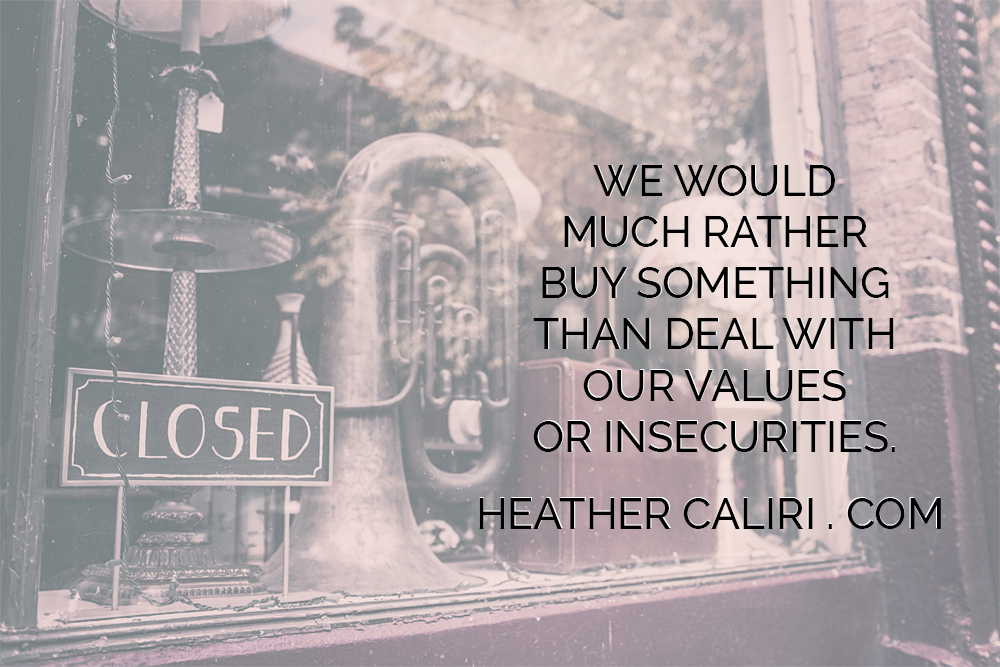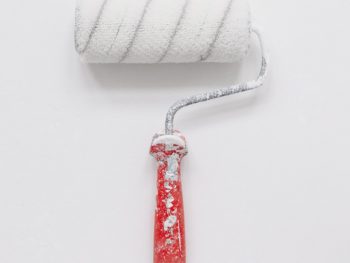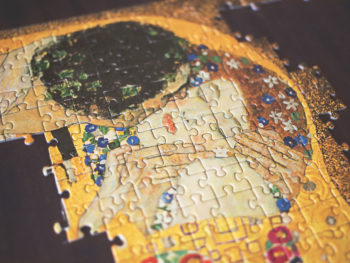
One of the first questions everyone asks me when they find out that we homeschool is some variation of what kind of curriculum do you use?
But the answer is I try not to use curriculum.
Here’s why: the more money I invest, the less it gets used.
I would really like to blame this on my kids. But I think that would be a little chickeny of me. Because a lot of the time, I’m the problem.
And that’s because so often, I think STUFF will be the savior.
I’ll feel a little unsure about some area of our life: math, say, or housekeeping, or crafting or basketweaving (okay, not that last one).
And I’ll think, “Surely there is a resource out there that will help me solve this problem.”
I will scour the interwebs for the solution. I will look up ideas in books or talk to friends. I will get fascinated by bells and whistles and sales pitches and bam, one hundred dollars later, I have a new gizmo.
And after all that effort, after all the conquesting of stuff, I will expect it to work.
And—surprise!—often it doesn’t.
Because no matter how applicable the stuff is, no matter how potentially helpful, it is still just a thing.
And in parenting–or in life!–stuff doesn’t solve problems on its own.
A needle only makes clothes if you know how to sew. A piano only makes music if you’ve practiced.
Expecting es and music to emerge from either tool without some know-how is foolish.
But so often, I think stuff will patch holes without any strategy from me.
I say all this because I—and our culture—has kind of a fixation with stuff. Stuff will solve problems; stuff will meet our needs.
But the truth is, the stuff can’t do the work for us.
The gizmos are only helpful if we are prepared for them: if we already have the heart-lessons learned, the self-awareness in place, and our strategy firm.
A corollary is: the more stuff you buy, the less time you have to actually do the heart-lessons, no? Each thing requires its own strategy.
A friend was telling me about a parenting webinar she participated in, where most of the advice was of the “find your values, find what works for your kids” variety. You know, the kind of advice that’s true, and the only kind that really works, but is also not super easy to distill into ten bullet points.
And then one of the leaders offered up a quick tip involving a household product, and on the forums, all anyone could talk about was that particular product. What brand would be most helpful? How much to use? What would be the strategy around that particular thing?
We would much rather use a thing than deal with our underlying values or insecurities.
I can hear someone saying “But what about math?” about right now, and I hear you. But a math curriculum isn’t going to erase any insecurities I have about math. It isn’t going to automatically make my kid excited about numbers and patterns. No: at the very best, it is a tool that will help us along on a journey we’ve already embarked on. It will not do the most important work for us.
So often, on the hard days of parenting, I feel at sea. I desperately need a rudder. I need places that feel firm to make me feel safe in my not-knowing.
And stuff feels safe. Stuff feels predictable, and controllable, and even comes with super saver shipping.
I am trying to learn to postpone acquiring stuff until I have found a real rudder. Some other fixed point (a voice is whispering, “God” pretty loud right now) that will guide me in the right direction. Clarified values. A sense of wisdom. A plan, a sense of confidence, a deep bone trust, an understanding of my kids. I am tired of substitutes. I am tired of short-cuts that turn out to be long detours.
I am longing for the maturity to drop anchor in the right places. I am longing for the maturity that depends on relationships, love, and wisdom for guidance, rather than anything that comes with a bar-code.
Image credit: CamKnows














I always tell the moms I help “This is how I would do it/what I would use/what I would try, but find out what works for you and for your kids”. And then I feel it sounds like I dont want to really help them (because why dont I just give them the solution?!).
Thank you for this post. It shows me I am actually doing the right thing.
Thanks Ilja. Hah! I think I’m so tempted to assume what I’m doing would work for everyone, but it simply doesn’t! Here’s to the forbearance to assume that other people are better at figuring out their kids and their values 🙂
very interesting. the PBH master class talks a lot about values. and the students talk about how *hard* it is. determining your personal values and goals and learning about your individual child takes more effort than buying a boxed curriculum.
i think a lot of people want to trust that the people who design curriculum know what they’re doing — but with the constant refrains of “it just didn’t work for us,” “we ended up not using it,” and etc., they obviously don’t know *everything*.
homeschooling is the opportunity for customized, personal, meaningful — so why buy off the rack?
for us, learning has to happen inside-out, not outside-in. the outside-in approach that ignores the learner just doesn’t seem to work very well. we work from personal interests and then find the materials and tools, knowledge and skills we need to do the things we want to do. so we’re investing time and energy as well as money in something we really care about, which makes much more sense.
Yes, the stuff works great when it’s an extension of interests and real projects. I love my computer–and use it every day–because it’s an invaluable tool for my writing. Out of that context, it could just be a waste of time.
It is so tempting to depend on others’ judgement for what we need–which is the whole point of consumerism, no? Of course, my post doesn’t go into all the other myriad reason why stuff is a problem.
I would encourage everyone reading here to check out Lori’s master class, whether you homeschool or not…hoping it’s on my schedule soon.
aw, thanks, heather 🙂
xoxoxo
I am so with you on this!!!!
Thanks, Renee 🙂